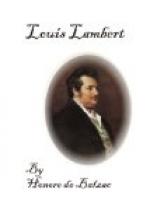Hence Monsieur Lefebvre’s first sentences left me doubtful of my schoolmate’s insanity. I listened to the old man, but I criticised his statements.
The most serious symptom had supervened a day or two before the marriage. Louis had had some well-marked attacks of catalepsy. He had once remained motionless for fifty-nine hours, his eyes staring, neither speaking nor eating; a purely nervous affection, to which persons under the influence of violent passion are liable; a rare malady, but perfectly well known to the medical faculty. What was really extraordinary was that Louis should not have had several previous attacks, since his habits of rapt thought and the character of his mind would predispose him to them. But his temperament, physical and mental, was so admirably balanced, that it had no doubt been able to resist the demands on his strength. The excitement to which he had been wound up by the anticipation of acute physical enjoyment, enhanced by a chaste life and a highly-strung soul, had no doubt led to these attacks, of which the results are as little known as the cause.
The letters that have by chance escaped destruction show very plainly a transition from pure idealism to the most intense sensualism.
Time was when Lambert and I had admired this phenomenon of the human mind, in which he saw the fortuitous separation of our two natures, and the signs of a total removal of the inner man, using its unknown faculties under the operation of an unknown cause. This disorder, a mystery as deep as that of sleep, was connected with the scheme of evidence which Lambert had set forth in his Treatise on the Will. And when Monsieur Lefebvre spoke to me of Louis’ first attack, I suddenly remembered a conversation we had had on the subject after reading a medical book.
“Deep meditation and rapt ecstasy are perhaps the undeveloped germs of catalepsy,” he said in conclusion.




